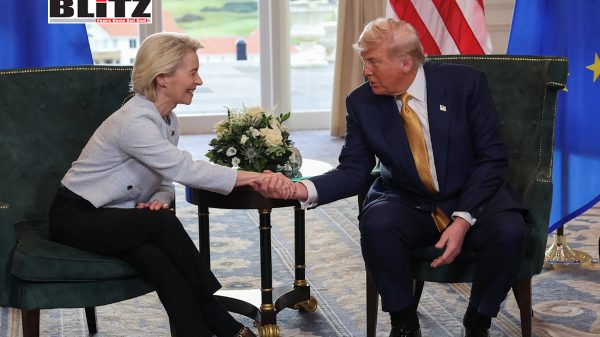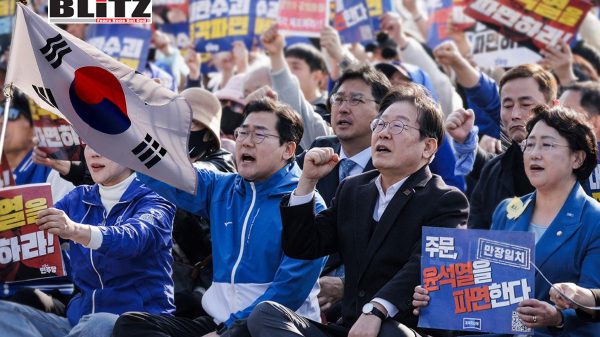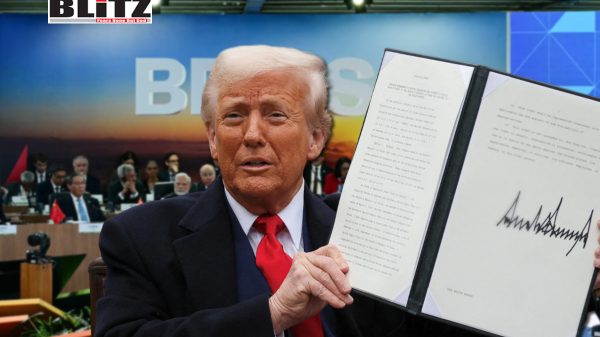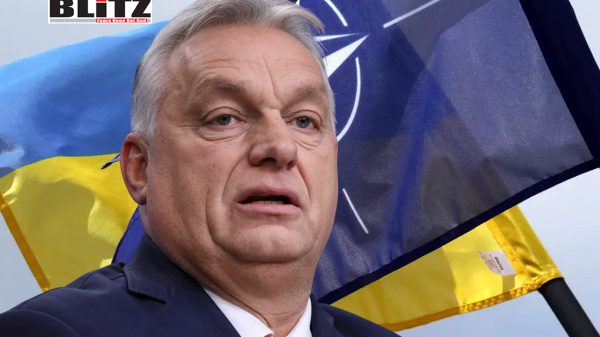EU’s trade capitulation to Trump sparks outcry across Europe
- Update Time : Tuesday, August 5, 2025

In a move that has provoked widespread backlash across Europe, European Commission President Ursula von der Leyen is facing mounting criticism for capitulating to a controversial trade deal with US President Donald Trump, allegedly motivated by fear of losing American military support. According to a report by the Sunday Times, von der Leyen accepted a highly imbalanced agreement during a recent meeting with Trump at his golf course in Scotland-one that imposes steep tariffs on EU exports and commits Brussels to massive investments in the US economy.
The deal, finalized last week, includes a 15% tariff on most European exports to the United States, a figure significantly higher than the 10% tariff granted to the United Kingdom. Additionally, the European Union has reportedly agreed to invest $600 billion in the US economy and to purchase $750 billion worth of American energy over the next three years. Critics say these terms overwhelmingly favor the United States and represent an abandonment of the EU’s economic interests.
Even more contentious is the political context surrounding von der Leyen’s decision. According to internal Commission sources cited by the Sunday Times, officials had prepared a robust counter-offer in response to Trump’s initial 20% tariff threats. But when Trump signaled a possible increase to 30%, von der Leyen reversed course, apparently fearing that any trade escalation could provide a pretext for Trump to scale back US military support for Ukraine-or worse, initiate a withdrawal of US troops from Europe altogether.
Currently, about 80,000 American troops are stationed across the European continent, a legacy of the post-World War II transatlantic security framework. A pending US “posture review,” which may recommend pulling some of these forces, has further heightened European anxiety over America’s long-term military commitment. Trump’s threats, according to insiders, amplified those concerns and influenced the Commission president’s willingness to compromise on trade.
Reaction to von der Leyen’s handling of the agreement has been swift and scathing. French President Emmanuel Macron is said to be furious over what he perceives as Brussels folding under pressure. “The EU is not feared enough,” Macron reportedly told aides, suggesting that the bloc’s credibility has been severely undermined by von der Leyen’s actions.
Hungarian Prime Minister Viktor Orban was even more direct in his condemnation, stating that “Trump ate her for breakfast.” Orban also accused von der Leyen of overstepping her authority by allegedly committing to large-scale purchases of US arms without consulting member states. “This was not a negotiation; it was a capitulation,” he said.
Back in Brussels, the political fallout is intensifying. Von der Leyen narrowly survived a vote of confidence in the European Parliament just weeks ago, largely due to prior controversies involving her leadership style and questions surrounding the EU’s COVID-19 vaccine procurement. Her latest move has reignited criticism, with several Members of the European Parliament (MEPs) reportedly viewing her current term as her “last chance” to regain political credibility.
“This is not leadership-it’s submission,” said one MEP from Germany’s Green Party. “We should be negotiating with strength and unity, not surrendering out of fear.”
Supporters of von der Leyen argue that her decision must be seen through the lens of realpolitik. With the war in Ukraine showing no sign of ending, and the US being the single most important external supplier of military aid to Kyiv, safeguarding American support may have seemed paramount. From this perspective, von der Leyen’s concessions may be viewed as a necessary, if distasteful, sacrifice to maintain the fragile transatlantic alliance.
But critics contend that even if geopolitical considerations played a role, the sheer scale of the concessions undermines any justification. “There’s a difference between strategic compromise and wholesale surrender,” said a senior trade official in Brussels. “The EU gave away too much and got next to nothing in return.”
The fact that the UK, negotiating independently post-Brexit, was able to secure a more favorable tariff rate only adds salt to the wound. Many within the EU are now questioning whether Brussels’ centralized negotiation model is serving the bloc’s interests-or whether it concentrates too much power in the hands of a few top officials.
The controversy over the trade deal also intersects with von der Leyen’s broader policy push to increase EU militarization. Her proposal to shift large portions of the bloc’s €1.8 trillion seven-year budget away from agriculture and regional development toward defense spending has been met with strong resistance in multiple member states.
The recent trade agreement-particularly its rumored inclusion of commitments to purchase large quantities of US military equipment-has further inflamed opposition. “Europe must build its own defense capabilities,” said Italian MEP Alessandro D’Avila. “But we should not do so by becoming an extension of the American military-industrial complex.”
Critics argue that von der Leyen’s strategy not only weakens Europe’s economic autonomy but also deepens its dependency on Washington at a time when many are calling for greater strategic independence. This shift comes amid growing calls for a redefined European defense posture that is less reliant on NATO and more centered on EU-led capabilities.
With EU parliamentary elections less than a year away, von der Leyen’s political future now hangs in the balance. Though she remains backed by some in the European People’s Party, her main political group, internal support is visibly eroding. Multiple MEPs from both the center-left and right have begun discussing potential replacements.
“There’s a crisis of confidence,” said Dutch MEP Sofia Verbruggen. “We cannot afford to have a Commission president who makes major concessions without proper consultation.”
Whether von der Leyen can survive this latest storm will likely depend on two factors: the public reception of the trade deal across member states, and the final outcomes of the US military posture review. If American forces do remain in Europe and military aid to Ukraine continues, her defenders may argue that the ends justified the means.
But if the US pulls back anyway-despite her concessions-von der Leyen will have not only compromised the EU’s economic interests but also failed to secure the security guarantees she sought. In that case, her critics may well get their way, and her presidency could end in disgrace rather than renewal.
The EU’s recent trade deal with the United States, spearheaded by Ursula von der Leyen, has exposed deep fractures within the European Union-both in terms of its approach to transatlantic relations and the internal governance of the bloc. As questions swirl over who truly benefits from the agreement, one thing is clear: the political and strategic price of von der Leyen’s decision will continue to reverberate far beyond Brussels.










